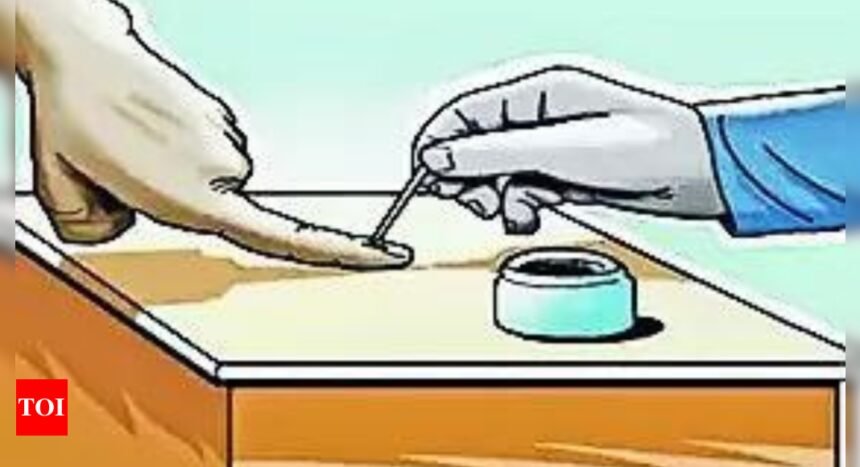[ad_1]
NEW DELHI: As the electoral fervor grips Ujjain, the Election Commission‘s announcement on March 16 has set the stage for a high-stakes battle in the upcoming Lok Sabha elections. Scheduled for May 13, the polls in Ujjain constituency are poised to witness a showdown between candidates from the Bharatiya Janata Party (BJP) and the Indian National Congress, with Anil Firojiya and Mahesh Parmar leading their respective parties.The results for Ujjain Lok Sabha Constituency are to be declared on June 4 along with all other Lok Sabha seats.
The Ujjain parliamentary constituency in Madhya Pradesh holds significant political importance due to its historical, cultural, and economic significance. With active participation from a diverse demographic, political contests between major parties like the BJP and INC shape the region’s course. Essential electoral issues include religious tourism, infrastructure, trade, agriculture, healthcare, and education, mirroring local aspirations. The BJP’s consistent electoral success highlights its dominance. The outcomes of Ujjain’s elections carry broader implications for governance and development in Madhya Pradesh. As a cultural icon, Ujjain strives for progress and prosperity through democratic processes.
In the 2019 parliamentary elections, Ujjain had a total of 1,661,229 electors, with 1,252,511 valid votes cast. Anil Firojiya of the Bharatiya Janata Party emerged victorious with 791,663 votes, defeating Indian National Congress candidate Babulal Malviya by a significant margin of 365,637 votes.
Similarly, in 2014, among a total of 1,525,481 electors, Prof Chintamani Malviya of the Bharatiya Janata Party secured victory with 641,101 votes, overshadowing his closest rival, Premchand Guddu of the Indian National Congress, by 309,663 votes.
In the 2009 elections, with a total of 1,253,686 electors, Guddu Premchand of the Indian National Congress emerged victorious with 326,905 votes, narrowly defeating Bharatiya Janata Party candidate Dr. Satyanarayan Jatiya by 15,841 votes.
In 2004, with 720,780 valid votes cast, Dr. Satyanarayan Jatiya of the Bharatiya Janata Party secured victory with 369,744 votes, defeating Premchand Guddu of the Indian National Congress by 70,403 votes.
Similarly, in 1999, among 1,107,836 electors, Dr. Satyanarayan Jatiya of the Bharatiya Janata Party emerged victorious with 360,103 votes, surpassing Tulasiram Silawat of the Indian National Congress by 68,038 votes.
In 1998, with a total of 1,031,238 electors, Dr. Satyanarayan Jatiya of the Bharatiya Janata Party won with 348,405 votes, defeating Dr. Avantika Prasad Marmat of the Indian National Congress by 93,887 votes.
In essence, the Ujjain parliamentary constituency’s electoral dynamics underscore its importance in shaping the political landscape of Madhya Pradesh, with the BJP’s consistent electoral success reflecting its dominance in the region. The constituency’s electoral outcomes carry implications for governance and development, reflecting the aspirations of its diverse populace.
The Ujjain parliamentary constituency in Madhya Pradesh holds significant political importance due to its historical, cultural, and economic significance. With active participation from a diverse demographic, political contests between major parties like the BJP and INC shape the region’s course. Essential electoral issues include religious tourism, infrastructure, trade, agriculture, healthcare, and education, mirroring local aspirations. The BJP’s consistent electoral success highlights its dominance. The outcomes of Ujjain’s elections carry broader implications for governance and development in Madhya Pradesh. As a cultural icon, Ujjain strives for progress and prosperity through democratic processes.
In the 2019 parliamentary elections, Ujjain had a total of 1,661,229 electors, with 1,252,511 valid votes cast. Anil Firojiya of the Bharatiya Janata Party emerged victorious with 791,663 votes, defeating Indian National Congress candidate Babulal Malviya by a significant margin of 365,637 votes.
Similarly, in 2014, among a total of 1,525,481 electors, Prof Chintamani Malviya of the Bharatiya Janata Party secured victory with 641,101 votes, overshadowing his closest rival, Premchand Guddu of the Indian National Congress, by 309,663 votes.
In the 2009 elections, with a total of 1,253,686 electors, Guddu Premchand of the Indian National Congress emerged victorious with 326,905 votes, narrowly defeating Bharatiya Janata Party candidate Dr. Satyanarayan Jatiya by 15,841 votes.
In 2004, with 720,780 valid votes cast, Dr. Satyanarayan Jatiya of the Bharatiya Janata Party secured victory with 369,744 votes, defeating Premchand Guddu of the Indian National Congress by 70,403 votes.
Similarly, in 1999, among 1,107,836 electors, Dr. Satyanarayan Jatiya of the Bharatiya Janata Party emerged victorious with 360,103 votes, surpassing Tulasiram Silawat of the Indian National Congress by 68,038 votes.
In 1998, with a total of 1,031,238 electors, Dr. Satyanarayan Jatiya of the Bharatiya Janata Party won with 348,405 votes, defeating Dr. Avantika Prasad Marmat of the Indian National Congress by 93,887 votes.
In essence, the Ujjain parliamentary constituency’s electoral dynamics underscore its importance in shaping the political landscape of Madhya Pradesh, with the BJP’s consistent electoral success reflecting its dominance in the region. The constituency’s electoral outcomes carry implications for governance and development, reflecting the aspirations of its diverse populace.
[ad_2]
Source link










